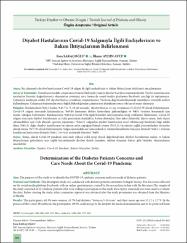Diyabet hastalarının covid-19 salgınıyla ilgili endişelerinin ve bakım ihtiyaçlarının belirlenmesi
Citation
SARAÇOĞLU E,AVCİ İ. A (2021). Diyabet Hastalarının Covid-19 Salgınıyla İlgili Endişelerinin ve Bakım İhtiyaçlarının Belirlenmesi. Türkiye Diyabet ve Obezite Dergisi , 5(2), 202 - 209. Doi: 10.25048/tudod.901442Abstract
Amaç: Bu çalışmayla diyabet hastalarının Covid-19 salgını ile ilgili endişelerini ve bakım ihtiyaçlarını belirlemek amaçlanmıştır. Gereç ve Yöntemler: Tanımlayıcı türdeki çalışmanın evrenini Türkiye’de yaşayan diyabet hastaları oluşturmaktadır. Veriler araştırmacılar tarafından literatür doğrultusunda oluşturulan çevrimiçi soru formu ile sosyal medya platformu Facebook aracılığı ile toplanmıştır. Çalışmaya katılmaya istekli 213 diyabet hastası örneklemi oluşturmuştur. Verilerin değerlendirilmesinde tanımlayıcı istatistik testleri kullanılmıştır. Çalışmaya başlamadan önce Sağlık Bakanlığı’ndan çalışma izni alındıktan sonra etik kurul onayı alınmıştır. Bulgular: Katılımcıların %61,5 kadın, %43,7’si “5-10 yıl arasında” diyabet hastası ve yaş ortalaması 55,12±12,79 olarak belirlenmiştir. Covid-19 salgını sürecinde katılımcıların; %69,0’ı hastaneye doktor kontrolüne gidemediğini ve %85’i virüsten korunmak için maske taktığını belirtmiştir. Katılımcıların %82,6’sı Covid-19’la ilgili haberleri televizyondan takip ettiklerini bildirmiştir. Covid-19 salgını sürecinde diyabet hastalarının en fazla gereksinim duydukları bakım ihtiyaçları; kan şekeri kontrolü, diyete uyum, fazla dışarı çıkamadıkları için evde düzenli egzersiz yapamama (%46,5), salgından diyabet hastalarının nasıl etkileneceği hakkında bilgi sahibi olma (%61,5), diğer diyabet hastalarının bu süreçte neler yaptığını bilmek isteme (%53,1), bu süreçte sağlık personelinden tavsiyeler almak isteme (%77,9) olarak belirlenmiştir. Salgın sürecindeki en fazla endişeleri; virüsün kendilerine bulaşma ihtimali (%68,1), virüsün kendilerini hasta etme ihtimali (%68,1) ve virüs nedeniyle ölmektir (%69). Sonuç: Sonuç olarak Covid-19 pandemi sürecinde yüksek riskli grup olarak değerlendirilen diyabet hastalarının endişe ve bakım ihtiyaçlarının giderilmesi için sağlık kurumlarında diyabet destek masaları, telefon danışma hatları gibi birimler oluşturulması önerilebilir. Öz:Aim: The purpose of this study is to identify the COVID-19 epidemic concerns and care needs of diabetes patients. Material and Methods: This descriptive study was conducted with diabetes patients constitutes living in Turkey. The data were collected on the social media platform Facebook, with an online questionnaire created by the researchers in line with the literature.The sample of the study consisted of 213 diabetic patients who were willing to participate in the study. Descriptive statistical tests were used to evaluate the data. Before starting the study, ethics committee approval was obtained after the study permission was obtained from the Ministry of Health. Results: The participants, 61.5% were women, 43.7% had diabetes “between 5-10 years” and their mean age was 55.12 ± 12.79. In the process of the Covid-19 outbreak, the participants; 69.0% could not go to the hospital for medical examination and to be protected from viruses 85% stated that they wore masks. 82,6% of the participants stated that they followed the news about Covid-19 on television. The most important care needs of diabetes patients during the Covid-19 outbreak determined as; blood sugar control, compliance with diet, not being able to exercise regularly at home because they cannot go out too much (46.5%), having information about how diabetic patients will be affected by the epidemic (61.5%), wanting to know what other diabetic patients do in this process (53.1%), asking for advice from health care personnel during this process (77.9%). The most concern of diabetes patients during the epidemic process are; the probability of the virus infecting them (68.1%), the probability of the virus making them sick (68.1%), and dying due to the virus (69%). Conclusion: As a result, it may be suggested to establish units such as diabetes support desks and telephone counseling lines in health institutions to address the concerns and care needs of diabetes patients who are considered to be a high-risk group during the Covid-19 pandemic process.
















